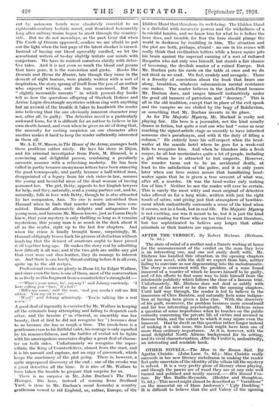The state of mind of a mother and a fiancee
waiting at home for the announcement of the verdict on the man they loVe is an interesting one, and one not easily dealt with. Mr. Hichens has handled this situation, in the opening chapters of his new novel, with the skill we expect from him, neither failing to convince us nor degenerating into the melodramatic.. The story is concerned with the problem of a man found innocent of a murder of which he knows himself to be guilty, and of his efforts to find some way to hide himself from the; intolerable publicity which follows the close of a famous trial., Unfortunately, Mr. Hichens does not deal so subtly with the rest of his novel as he does with the opening chapters., Until half way through, the reader is led to believe in the• innocence of Clive Baratrie, and naturally feels some indigna- tion at having been given a false clue. With the discovery of his guilt, moreover, the problem becomes more sensational' and far less interesting psychologically. Mr. lichen raises a question of some importance when he touches on the public curiosity concerning the private life of victim and accused in famous trials, and the extent to which it may injure even the innocent. Had he dwelt on this question rather longer instead of making it a side issue, this book might have been one of more than ordinary importance. As it is, however, with the usual delightful North African background for its setting, and its vivid characterization, After the Verdict is, undoubtedly an interesting and readable book.






































 Previous page
Previous page